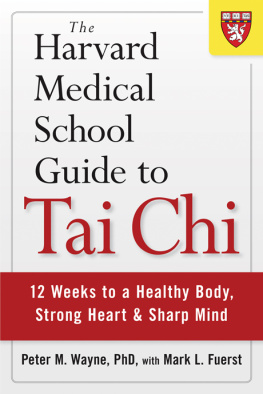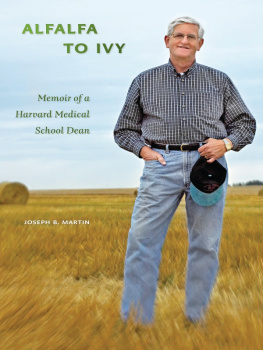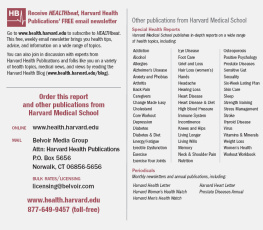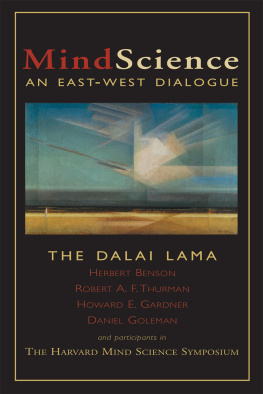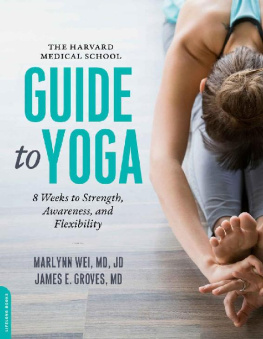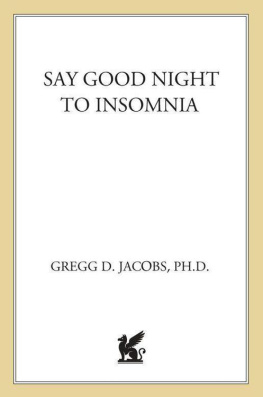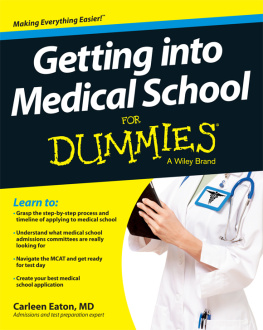The Harvard Medical School Guide to Tai Chi is a significant milestone in the integration of Eastern and Western medicine. It deftly summarizes the scientific evidence for the healing potential of this traditional Chinese system of body movement and gives readers practical advice for using it in everyday life. I recommend it highly.
Andrew Weil, MD, Professor of Medicine, University of Arizona, and author of 8 Steps to Optimum Health
Dr. Wayne gives us a magnificent and useful contribution for the betterment of our health and well-being through the proper integration of Tai Chi into our lives.
Herbert Benson, MD, author of The Relaxation Response and Professor of Medicine, Harvard Medical School
Peter Wayne is that rare individual who is sufficiently bilingual to introduce Tai Chi to a largely open-minded yet skeptical medical community and to sensitively and movingly celebrate its timeless poetry, power, and appeal. This is a book for all to learn from and enjoy.
David Eisenberg, MD, Harvard School of Public Health and the Samueli Institute, and Former Chief of the Division of Research and Education in Complementary and Integrative Medical Therapies, Harvard Medical School
Evidence has shown that unhealthy lifestyle is the cause of most if not all chronic conditions such as diabetes, arthritis, and heart disease. Dr. Waynes book, with his expertise in medical research and Tai Chi, is a significant step towards modernizing Tai Chiessential to making Tai Chi a central part of practical and effective solutions to the epidemic of chronic disease.
Dr. Paul Lam, director of the Tai Chi for Health Institute and author of Teaching Tai Chi Effectively and Tai Chi for Beginners
Peter Wayne has long been a leader in scientific research into how Tai Chi boosts health and well-being. In this brilliant book, he blends rigorous Western science with Eastern wisdom to present an illuminating and thoroughly modern view of a wonderful, life-enhancing art. I recommend it highly to anyone interested in Tai Chi, from novice to advanced practitioner.
Yang Yang, PhD, director, Center for Taiji and Qigong Studies, and author of Taijiquan: The Art of Nurturing, The Science of Power
Highly readable and deeply informative.... This book has the potential of once and for all dispelling any lingering myths that Tai Chi and Qigong, and Western sciences growing understanding of its uses, are anything less than a profound health revolution that can help prevent or treat the majority of health challenges, and ultimately may save society hundreds of billions if not trillions in future annual health care costs. The Harvard Medical School Guide to Tai Chi may well be that point we look back to and say, That was the tipping point that unleashed the building wave of Tai Chi, which has now transformed modern health care.
Bill Douglas, founder of World Tai Chi and Qigong Day and author of The Complete Idiots Guide to Tai Chi and QiGong
ABOUT THE BOOK
Conventional medical science on the Chinese art of Tai Chi now shows what Tai Chi masters have known for centuries: regular practice leads to more vigor and flexibility, better balance and mobility, and a sense of well-being. Cutting-edge research from Harvard Medical School also supports the long-standing claims that Tai Chi also has a beneficial impact on the health of the heart, bones, nerves and muscles, immune system, and the mind. This research provides fascinating insight into the underlying physiological mechanisms that explain how Tai Chi actually works.
Dr. Peter M. Wayne, a longtime Tai Chi teacher and a researcher at Harvard Medical School, developed and tested protocols similar to the simplified program he includes in this book, which is suited to people of all ages, and can be done in just a few minutes a day. This book includes:
- The basic program, illustrated by more than 50 photographs
- Practical tips for integrating Tai Chi into everyday activities
- An introduction to the traditional principles of Tai Chi
- Up-to-date summaries of the research literature on the health benefits of Tai Chi
- How Tai Chi can enhance work productivity, creativity, and sports performance
- And much more
PETER WAYNE, PhD, is Assistant Professor of Medicine at Harvard Medical School and the Director of Research for the Osher Center for Integrative Medicine, jointly based at Harvard Medical School and Brigham and Womens Hospital. Prior to this appointment, Dr. Wayne served as the Director of Tai Chi and Mind-Body Research Programs at the Osher Research Center and Founding Research Director at the New England School of Acupuncture. He has more than thirty-five years of training experience in Tai Chi and Qigong and is an internationally recognized teacher of these practices.
Sign up to learn more about our books and receive special offers from Shambhala Publications.

Or visit us online to sign up at shambhala.com/eshambhala.

This book is dedicated to my parents and family, for their love, support, and encouragement all along the way and to all my teachers and mentors, East and West, for their wisdom, generosity, and inspiration.
Shambhala Publications, Inc.
Horticultural Hall
300 Massachusetts Avenue
Boston, Massachusetts 02115
www.shambhala.com
2013 by Harvard Health Publications
Cover design: Deborah Hodgdon
The information in this book is not intended as a substitute for personalized medical advice. The reader should consult a physician before beginning this or any exercise program. The author and the publisher assume no responsibility for pain or injury experienced from the practice of exercises presented here.
All rights reserved. No part of this book may be reproduced in any form or by any means, electronic or mechanical, including photocopying, recording, or by any information storage and retrieval system, without permission in writing from the publisher.
Library of Congress Cataloging-in-Publication Data
Wayne, Peter.
The Harvard medical school guide to tai chi: 12 weeks to a healthy body, strong heart, and sharp mind / Peter Wayne, with Mark Fuerst.
p. cm.
Includes bibliographical references and index.
eISBN 978-0-8348-2848-3
ISBN 978-1-59030-942-1 (pbk.: alk. paper)
1. Tai chiTherapeutic use. 2. Health. I. Fuerst, Mark. II. Title.
RM727.T34W39 2012
613.7148dc23
2012025187
Contents
Proof of the Promise
Tai Chi through the Lens of Modern Science
Health care has always undergone change. Old diseases disappear or are conquered; new ones take their place. New cures sometimes bring unexpected problems. Personal and societal expectations for health and longevity shift tremendously. Western patients now are asking for more prevention and health sustenance. Many want soft-touch in addition to hard technology. While many acute problems seem to be under control, it seems that there are not enough solutions for living with or gracefully managing chronic illness. New discoveries and directions are continually being examined.
Part of the quest for new answers is re-examining older approaches to illness. Have therapies that can provide answers to new problems withstood the test of time? Certainly, the popularity and recent scientific research into acupuncture and Ayurvedic medicine suggest that, in parallel with globalization, there is a new opening to non-biomedical systems. Ive had a ringside seat on this emergent global perspective with my own work building links between Asian medicine and modern medicine. Sorely missing has been a book that bridges the wisdom of Tai Chi with the scientific insights of biomedicine. This exceptional book has finally been written, remarkably within the context of a leading medical school; it provides the needed platform to link East and West.
Next page
